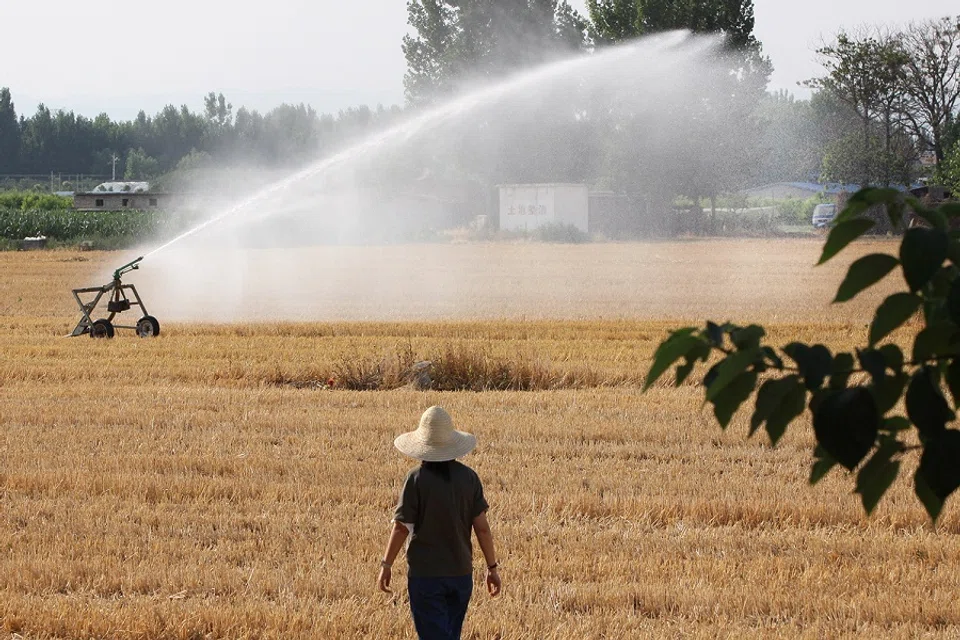Pandemic could stymie China's poverty alleviation and rural revitalisation efforts
The Covid-19 pandemic has badly hit the Chinese economy, with ordinary folk bearing the brunt of the impact. Migrant workers and rural farmers have had to pivot to other fields to make ends meet, and even then the outlook is still grim. Can the authorities safeguard its efforts in poverty alleviation and rural revitalisation? Zaobao journalists Miao Zong-Han and Zeng Shi look into the issue.

China's Covid-19 outbreak is easing but the economy has not picked up and news of civil servant pay cuts in many regions is rife. Under such circumstances, one can imagine that the lives of ordinary folk are tough.
Migrant workers in cities had to tighten their belts when all work was suspended during the pandemic, while rural workers working in tourism and agricultural sales saw their incomes dip.
Over the past six months, the pandemic has dealt a huge blow to the Chinese economy. In a report published by a China macroeconomic forum organised by Renmin University of China and China Chengxin International Credit Rating Co Ltd on 25 June, China's real GDP growth was estimated to be 2.7% in the first half of the year.
Following the easing of the pandemic situation, while China's surveyed urban unemployment rate fell to 5.9% in May from a high of 6.1% in April, it is still above the government's target of keeping the full-year unemployment rate below 5.5%.
Serious blow to migrant workers
Over the past few weeks, stories have been circulating online about agencies being set up in Jiangsu, Zhejiang and Shanghai to implement civil service pay cuts. This seems to suggest that the economy is so bad that even "iron rice bowls" within the government are not spared.
Chen, a Sichuan native who is almost 50, has been a janitor in Beijing for over 20 years. As her company is hired by public institutions, she still got her full salary when she stopped work due to the anti-epidemic restrictions. But her son was not as lucky.
She told Zaobao that she has been using her savings to build a house back in her hometown since 2019. Later, her son who works in Chengdu and is planning to get married wanted to buy a house in their hometown too, so she helped him with the down payment. But her son suffered a pay cut during the pandemic and Chen was left to shoulder the monthly instalments.
She lamented, "I'm burning the candle at both ends. But I have to hang on. Otherwise, am I supposed to just sit and watch the bank take away my house?" - a janitor in Beijing.

Chen said, "My son is earning less than 2,000 RMB to 3,000 RMB [US$298 to US$448] a month. He can't even afford his rent or living expenses. How is he going to repay the loan? He can only rely on me for that."
Chen shared that over the past two years there were many other migrant workers who took a bank loan to purchase a house and have not been able to make the monthly loan payments because of the pandemic.
Now, she has to pay for the construction of her house on the one hand and also fork out her son's home loan on the other. She lamented, "I'm burning the candle at both ends. But I have to hang on. Otherwise, am I supposed to just sit and watch the bank take away my house?"
As the farm is highly reliant on outings by families and tourists, the business was badly hit by the pandemic.
Rural economy also affected
The rural economy has also been hit by the pandemic.
Lin owns a fruit-picking farm in Guangzhou's Taihe town. Eight years ago, he signed a contract with a nearby forest park and converted about ten acres of land into a fruit-picking farm. He does everything himself from growing the grapes and melons to setting up the tents, fertilising the crops and pruning the branches.
Business picked up after the first few years, but then the pandemic hit.
He told Zaobao that it is getting harder to make a living as the planting costs are high and the number of tourists are low. He said, "People are unwilling to spend money now."
As the farm is highly reliant on outings by families and tourists, the business was badly hit by the pandemic. Lin was left with no choice but to sell the fruits at a loss once they started to ripen. If he did not manage to do so, the fruits would just be left to rot.

Due to the farm's favourable location, the yearly rent is nearly 5,000 RMB per acre or around ten times that of the average farm. The steep rent plus wages for his two workers have put Lin in the red over the past two years.
"I made major losses in the first year of the pandemic and barely covered the rent in the second year. Looking at the situation this year, I'm not optimistic at all," he said.
Lin added that southern China experienced droughts between January and March and was hit by heavy rains between April and June. This had a great impact on crop yield. Moreover, because of new Covid-19 outbreaks, people have become extremely careful when making travel plans, even with short trips to nearby regions.
Lin is thinking of returning to his hometown of Zhanjiang because the cost of agricultural land is much lower there. He does not know how much longer he can survive in Guangzhou.
Moreover, Chinese consumers have been guarding their purse strings more tightly over the last two years. And it does not help that fruits from fruit-picking farms are often double the market price. Most visitors either leave empty-handed or only let their kids pick one or two bunches of fruit to prove that they have visited the farm.
Lin is thinking of returning to his hometown of Zhanjiang because the cost of agricultural land is much lower there. He does not know how much longer he can survive in Guangzhou.

Meanwhile, some orchards acquired by the government are seeing a steady income. Lu, a farmer at a grape-picking farm in Guangzhou's Luntou village, shared that many fruits were left to rot as there were few visitors during the pandemic. But this did not affect his income as he draws a guaranteed monthly salary.
Guangxi wildlife farmers face massive losses
On the other hand, after the Covid-19 outbreak in 2020, the Standing Committee of the National People's Congress banned illegal wildlife trade and indiscriminate wild animal meat consumption. As a result, Guangxi faced problems in moving away from the captive breeding of wildlife over the past two years.
He, a former snake breeder in Guangxi, told Zaobao that in the pre-pandemic days, dozens of tonnes of snakes would be delivered to Guangzhou every day. But snake breeding was prohibited following the government's ban, and many people lost their money. He himself has lost about 1.1 million RMB in bad debt.
He added that many like him either have switched careers or are left with serious debt. While local governments have pointed out ways of transitioning to other sectors of the industry, only a minority have managed to eke out a living from breeding snakes for medicinal purposes, which has a much lower demand compared with snakes for consumption.
Due to the pandemic, poverty alleviation and rural revitalisation in China may be taking two steps forward and one step back.

Those lifted out of poverty at risk
But this is not all. Due to the pandemic, poverty alleviation and rural revitalisation in China may be taking two steps forward and one step back. Over the past month, officials have warned that the pandemic is adding to the difficulties of stabilising employment for people coming out of poverty.
Liu Huanxin, head of the National Rural Revitalization Administration, said in early June that the target of having no less than 30 million people coming out of poverty being employed this year was a basic requirement and also a bottom line that must be kept. He stressed the need to firmly guard against a large-scale slide back into poverty due to unstable employment.
Hong Tianyun, deputy head of the National Rural Revitalization Administration, said on 27 June that the next step would be to strengthen monitoring and assistance to prevent a return to poverty, conduct in-depth investigations, and identify and help farmers at risk of returning to poverty.

Associate Professor Jhang Hong Yuan from Chihlee University of Technology's Department of International Trade told Zaobao that as China's economic growth is not as strong as before, poverty alleviation through conventional "structural" channels such as employment and migrant work has been disrupted.
At the same time, having experienced the China-US trade war and Covid-19 pandemic, the government is already cash-strapped and lacks the ability to use social welfare or the state's budget to help the poor.
Thus, he believes that China's "targeted poverty alleviation" (精准扶贫) policy can only save those in absolute poverty. Another point to note is that conflicts are less severe in the rural areas due to strong kinship ties and a collective village identity. In contrast, "relative poverty" in cities leads to unequal status and opportunities, which easily results in social exclusion and intensifies social conflicts. Thus, the officials will be focusing on this aspect for the time being.
Related: Shanghai hit by civil servant pay cuts | China's desperate measures to avert a looming economic crisis | New Great Wall of China against Covid-19 built with flesh and blood of the little people | Chinese farmers struggling with excessive anti-epidemic measures | Lifting 'the poorest of the poor' out of poverty in Sichuan: Does poverty alleviation mean uprooting people from their homes? | Plight of China's new generation of young migrant workers highlights pitfalls of labour reforms | Village entrepreneurs' love-hate relationship with e-commerce




![[Photos] Fact versus fiction: The portrayal of WWII anti-Japanese martyrs in Taiwan](https://cassette.sphdigital.com.sg/image/thinkchina/3494f8bd481870f7c65b881fd21a3fd733f573f23232376e39c532a2c7593cbc)

